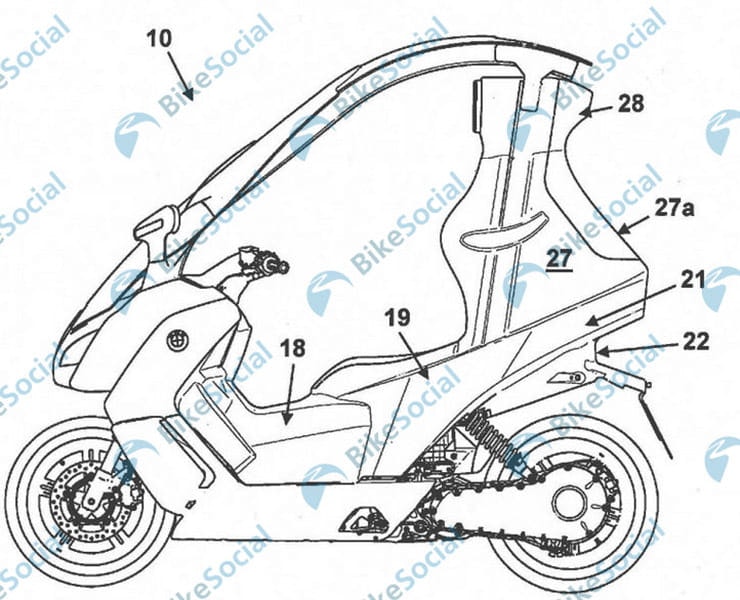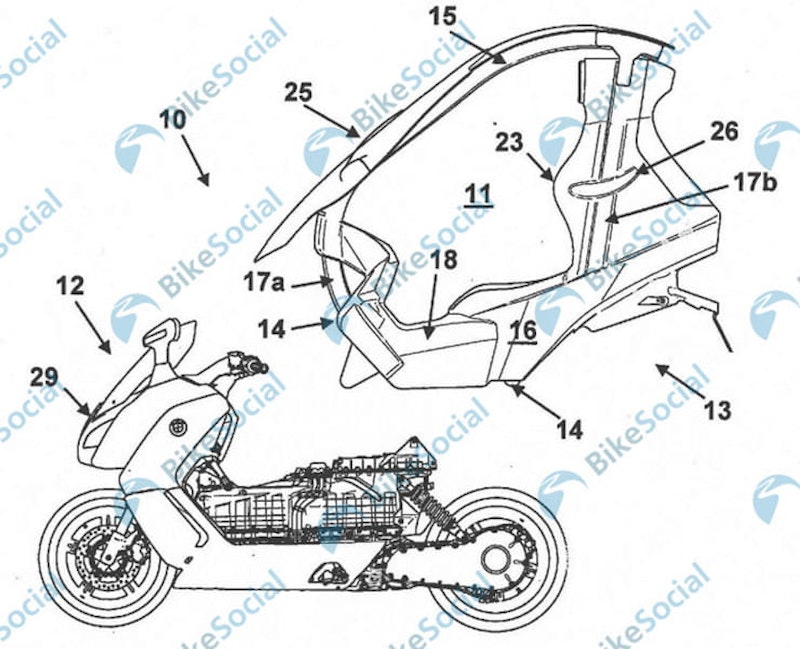BMW developing new C1 roofed scooter – but this time it’s electric
By Ben Purvis
Motorcycle Journalist
29.05.2019
New patent applications filed by BMW have revealed that the firm is developing a new scooter based on the same idea that spawned the C1 back at the tail end of the last millennium.
Remember the BMW C1? Of course you do. Even if you never rode one – or even saw one in the metal – the roofed scooter that was designed to protect its rider in the event of a crash garnered massive publicity during its short life.
Not many were sold, but the idea of a bike that you were clamped into with a seatbelt, surrounded by a safety cage, was inevitably going to grab the attention of the mainstream media as well the specialist press. Throw in controversies including a long-running dispute in the UK as C1 riders tried to gain exemption from the helmet legislation and it’s a machine that’s gone down in BMW’s history, whether for better or for worse.
To be fair, while the C1’s combination of a high price, ungainly looks, hefty weight and sluggish performance didn’t make for a convincing alternative for most city-bound scooter riders, there’s still no disputing the seed of genius that lay in the idea behind it. After all, many car drivers on our overcrowded roads look on in envy as those on two wheels squeeze past them and disappear into the distance. Why don’t they follow suit? Inevitably the answers are the same: ‘Bikes are too dangerous’ or ‘the weather’s not good enough’ are always high in the list of excuses to remain cocooned in a car.
So a bike with a roof, a seatbelt and a car-style safety cell, should go a long way to bridging the gap, particularly if it’s easy to ride and falls into a licence class that allows a car driver to use it without undergoing extra testing and training.
The original C1 was only offered between 2000 and 2002, barely enough time to let potential customers overcome the initial shock of its appearance, let alone the second jolt they got when seeing £4k price tag (bear in mind that £4k bought rather more bike back then than it does today). More recently BMW has shown a bit more patience with its fringe models – like the C Evolution, for instance. It’s been around since 2012 and, despite a slow take-up, remains a key model as BMW’s stake in the electric bike market.
So how about bundling the electric C Evolution with the same thinking that brought us the BMW C1? That seems to be the firm’s new plan, and it’s exactly what the latest patent application shows.
BMW has already flirted with the idea of an electric C1; it showed a concept of such a machine, the C1-E, in 2009. But the new patent reveals a more pragmatic approach, making the entire safety cell a bolt-on unit that’s designed to fit directly onto the existing C Evolution scooter’s chassis.
According to the patent’s text, the safety cell uses modern materials like carbon fibre to keep weight to a minimum and strength high. BMW is already a pioneer in that field, offering mass-produced cars including the relatively affordable i3 electric hatchback built around a complete carbon-fibre monocoque chassis. And of course the exotic HP4 Race revealed that the same technology is also heading to bikes.
The C Evolution’s skateboard-style chassis, which uses the battery packs as the main structure and keeps their weight low down, means it’s relatively easy to swap the bodywork sitting above it. Here, the idea is to remove the seat and tail and to replace it with the safety cell and roof, including a windscreen wiper, X-shaped seat belts going over both shoulders and side protection buffers designed to keep you off the tarmac in the event of an accident. There’s no provision for a pillion, but there’s a decent-sized luggage space behind the seat.
Such is the bolt-on nature of the safety cell, if BMW puts it into production in the way it’s seen in the patent it should even be possible to retrofit it to existing C Evolution scooters, or perhaps even to buy both the roofed and standard bodywork and to switch between them with a little bit of wrenching.
BMW has designed the cell so important structural parts like the suspension and steering don’t need to be messed with when attaching it to the C Evolution, and electronics like the instruments also don’t need to be disconnected. No doubt the price would be high, particularly given the C Evolution’s existing cost of £14,025, but if you’re a high-flying executive sick of battling with public transport, traffic and congestion charges, a machine like this, able to deliver you to the office with the speed of a bike but offering protection from both accidents and the worst of the weather, it might be exactly what you need.
There’s no guarantee that the idea shown in this patent will ever see the light of day, but we wouldn’t be surprised if BMW reveals a concept bike to test the customer reaction.
Share on social media:

